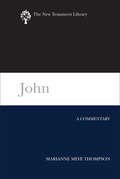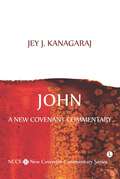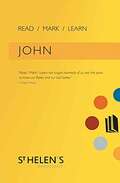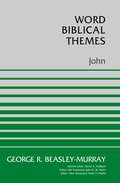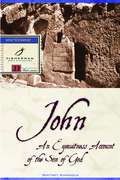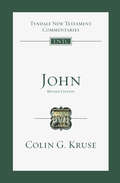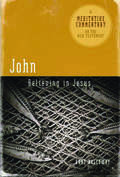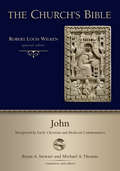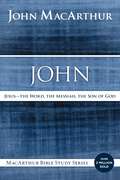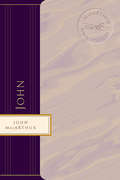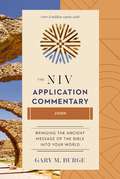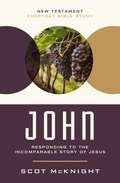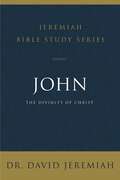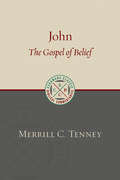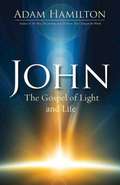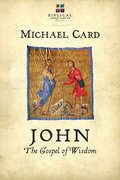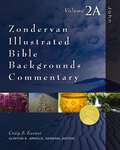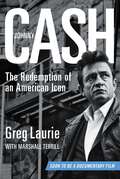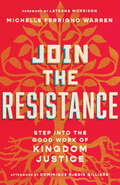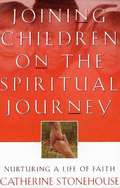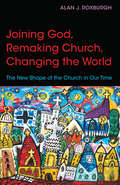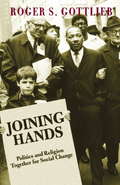- Table View
- List View
John: A Commentary (New Testament Library)
by Marianne Meye ThompsonAlmost from the earliest days of the church, John's distinctive presentation of Jesus has provoked discussion about its place among the other Gospels. One cannot help but see the differences from the Synoptics and wonder about the origins and character of John. In this new volume in the New Testament Library series, Marianne Meye Thompson explores the ministry and significance of Jesus of Nazareth as presented in the Gospel of John, paying special attention to the social, cultural, and historical contexts that produced it. John's Gospel, Thompson posits, is the product of a social-cultural world whose language, commitments, and contours must be investigated in order to read John's narrative well. In doing so, Thompson studies the narrative, structure, central themes, and theological and rhetorical arguments found in the Fourth Gospel. Thompson's expert commentary unpacks and illuminates John's unique witness to Jesus--who he was, what he did, and what that means. The New Testament Library series offers authoritative commentary on every book and major aspect of the New Testament, providing fresh translations based on the best available ancient manuscripts, critical portrayals of the historical world in which the books were created, careful attention to their literary design, and a theologically perceptive exposition of the biblical text. The contributors are scholars of international standing. The editorial board consists of C. Clifton Black, Princeton Theological Seminary; M. Eugene Boring, Brite Divinity School; and John T. Carroll, Union Presbyterian Seminary.
John: A New Covenant Commentary (NCCS)
by Jey J KanagarajIn this commentary Kanagaraj examines how John projects the church as God's new covenant community, which is characterized by two virtues: love and obedience. Impossible to exhibit under the old covenant based on Moses' Law, these qualities becamepossible by the initiative grace and faithfulness of God revealed in Jesus and demonstrated by the power of the Spirit. God's new community is an inclusive and progressive community because its witness to Jesus in a world that hates and persecutes it has the power to bring in all people so that they may become one flock under one shepherd. Kanagaraj argues that the idea of founding and nurturing a new community was in God's heart even before the time of creation and not just at the time of incarnation.
John: A Small Group Bible Study (Read/Mark/Learn)
by St Helen'SRead / Mark / Learn is a small group Bible study series that is designed to equip people to study God’s Word for themselves – and in studying it, know God’s purpose for their lives. <p><p> Each book is devoted to studying a whole book of the Bible and so enables people to understand Scripture in context. In an era that claims that the Bible can say what you want it to say, it is important to re–establish the truth that you just can’t – if you explain the Scripture with honesty, fairness and in context.
John: A Survey Of The Gospel, Epistles, And Apocalypse (Word Biblical Themes)
by George R. Beasley-MurrayA companion series to the acclaimed Word Biblical CommentaryFinding the great themes of the books of the Bible is essential to the study of God's Word and to the preaching and teaching of its truths. These themes and ideas are often like precious gems: they lie beneath the surface and can only be discovered with some difficulty. While commentaries are useful for helping readers understand the content of a verse or chapter, they are not usually designed to help the reader to trace important subjects systematically within a given book a Scripture.The Word Biblical Themes series helps readers discover the important themes of a book of the Bible. This series distills the theological essence of a given book of Scripture and serves it up in ways that enrich the preaching, teaching, worship, and discipleship of God's people. Volumes in this series:Written by top biblical scholarsFeature authors who wrote on the same book of the Bible for the Word Biblical Commentary seriesDistill deep and focused study on a biblical book into the most important themes and practical applications of themGive reader&’s an ability to see the "big picture" of a book of the Bible by understanding what topics and concerns were most important to the biblical writersHelp address pressing issues in the church today by showing readers see how the biblical writers approached similar issues in their dayIdeal for sermon preparation and for other teaching in the church Word Biblical Themes are an ideal resource for any reader who has used and benefited from the Word Biblical Commentary series, and will help pastors, bible teachers, and students as they seek to understand and apply God&’s word to their ministry and learning.
John: An Eyewitness Account of the Son of God (Fisherman Bible Studyguide Series)
by Whitney KuniholmThe Living WordWhat would it have been like to witness Christ’s life on earth? The apostle John wrote about Jesus’ earthly ministry from the perspective of one who was there. He saw Jesus teach, heal, pray, die, and live again. And he wanted to tell Christ’s story.John’s Gospel is a personal account about the life of Jesus–the living Word. Jesus is the one who can transform our empty lives and satisfy our deepest hunger. In this studyguide, Whitney Kuniholm guides you through every chapter of the book of John, bringing you face-to-face with the Son of God–who he is and what it means to follow him.
John: An Introduction And Commentary (Tyndale New Testament Commentaries #Volume 4)
by Colin G. KruseAmong the Gospels, John's is unique. It has a structure with long conversations and extended debates, and much of its content is not found elsewhere. Jesus' relationship to the Father and his teaching on the Holy Spirit are given special prominence. Ultimately, faith, believing in Jesus, is at the center—with signs highlighted to provoke faith, and stories of those who responded to Jesus as examples of faith. Colin Kruse ably shows how the Fourth Gospel weaves its themes of belief and unbelief into its rich Christology. The Tyndale New Testament Commentaries have long been a trusted resource for Bible study. Written by some of the world's most distinguished evangelical scholars, these twenty volumes offer clear, reliable, and relevant explanations of every book in the New Testament. The original, unrevised text of this volume has been completely retypeset and printed in a larger, more attractive format with the new cover design for the series. These Tyndale volumes are designed to help readers understand what the Bible actually says and what it means. The introduction to each volume gives a concise but thorough description of the authorship, date, and historical background of the biblical book under consideration. The commentary itself examines the text section by section, drawing out its main themes. It also comments on individual verses and deals with problems of interpretation. The aim throughout is to get at the true meaning of the Bible and to make its message plain to readers today.
John: Believing in Jesus (Meditative Commentary #4)
by Gary HollowayThrough meditation on the Gospel of John, we experience the life of Jesus, the Word of God made flesh. Written by one who calls himself "the disciple whom Jesus loved," the Gospel of John paints an intimate portrait of Jesus as one who is intimate with God the Father, who calls disciples to follow him, and who gives signs that point his listeners to God.
John: Interpreted by Early Christian and Medieval Commentators (The Church's Bible)
by Bryan A. Stewart Michael A. ThomasThis Church&’s Bible volume on the Gospel of John contains carefully selected and translated homilies and commentaries from such church fathers as Cyril of Alexandria, Cyril of Jerusalem, Gregory the Great, Theodore of Mopsuestia, Augustine, Athanasius, and the Venerable Bede. Ranging chronologically from the second century to the ninth, these substantial patristic selections provide an illuminating window into the breadth of the church&’s interpretive tradition on John&’s Gospel.Authors of Works Excerpted Ambrose of Milan Ammonius of Alexandria AphrahatApostolic Constitutions Athanasius of Alexandria Augustine of Hippo Basil of Caesarea Bede Caesarius of Arles Clement of Alexandria Cyprian of Carthage Cyril of Alexandria Cyril of Jerusalem Didymus the Blind Ephrem the Syrian Gregory of Nazianzus Gregory of Nyssa Gregory the Great Hilary of Poitiers Hippolytus of Rome Irenaeus of Lyons Jerome John Cassian John Chrysostom John of Damascus John Scotus Eriugena Justin Martyr Leo the Great Maximus of Turin Novatian Origen of Alexandria Peter Chrysologus Romanos the Melodist Rufinus of Aquileia Severian of Gabala Sophronius of Jerusalem Tertullian of Carthage Theodore of Mopsuestia Theodoret of Cyrus Theophilus of Alexandria
John: Interpreted by Early Christian and Medieval Commentators (The Church's Bible)
by Bryan A. Stewart Michael A. ThomasThis Church&’s Bible volume on the Gospel of John contains carefully selected and translated homilies and commentaries from such church fathers as Cyril of Alexandria, Cyril of Jerusalem, Gregory the Great, Theodore of Mopsuestia, Augustine, Athanasius, and the Venerable Bede. Ranging chronologically from the second century to the ninth, these substantial patristic selections provide an illuminating window into the breadth of the church&’s interpretive tradition on John&’s Gospel.Authors of Works Excerpted Ambrose of Milan Ammonius of Alexandria AphrahatApostolic Constitutions Athanasius of Alexandria Augustine of Hippo Basil of Caesarea Bede Caesarius of Arles Clement of Alexandria Cyprian of Carthage Cyril of Alexandria Cyril of Jerusalem Didymus the Blind Ephrem the Syrian Gregory of Nazianzus Gregory of Nyssa Gregory the Great Hilary of Poitiers Hippolytus of Rome Irenaeus of Lyons Jerome John Cassian John Chrysostom John of Damascus John Scotus Eriugena Justin Martyr Leo the Great Maximus of Turin Novatian Origen of Alexandria Peter Chrysologus Romanos the Melodist Rufinus of Aquileia Severian of Gabala Sophronius of Jerusalem Tertullian of Carthage Theodore of Mopsuestia Theodoret of Cyrus Theophilus of Alexandria
John: Jesus - The Word, the Messiah, the Son of God (MacArthur Bible Studies)
by John F. MacArthurThe Gospel of John is filled with profound truths and rich spiritual stories. Stories of Christ's miracles that inspire His followers; stories of a death that redeems the lost; and stories of a resurrection that provides us with hope for eternal glory. Pastor John MacArthur will take you through the fourth gospel account, passage by passage, so that you can better understand everything from its unique and urgent tone to the ways the apostle John makes his case for Christ's sovereignty and victory.Every miracle, teaching, and action of Jesus that his disciple John captures in his Gospel has one clear purpose: to prove that Jesus is the Word, the Messiah, and the Son of God.The dramatic milestones of Christ's ministry, as portrayed by John, have invited millions of believers throughout the ages into a saving faith with Jesus Christ, and will lead you into a deeper understanding of the ultimate story of Jesus, the Son of God.—ABOUT THE SERIES—The MacArthur Bible Study series is designed to help you study the Word of God with guidance from widely respected pastor and author John MacArthur. Each guide provides intriguing examinations of the whole of Scripture by examining its parts and incorporates:Extensive, but straight-forward commentary on the text.Detailed observations on overriding themes, timelines, history, and context.Word and phrase studies to help you unlock the broader meaning and apply it to your life.Probing, interactive questions with plenty of space to write down your response and thoughts.
John: Jesus ?The Word, the Messiah, the Son of God (MacArthur Bible Studies)
by John MacarthurThese study guides, part of a 16-volume set from noted Bible scholar John MacArthur, take readers on a journey through biblical texts to discover what lies beneath the surface, focusing on meaning and context, and then reflecting on the explored passage or concept. With probing questions that guide the reader toward application, as well as ample space for journaling, The MacArthur Bible Studies are an invaluable tool for Bible Students of all ages.
John: John (The NIV Application Commentary)
by Gary M. BurgeThe NIV Application Commentary helps you communicate and apply biblical text effectively in today's context.The Gospel of John tells us the story that is the foundation of the distinctive teaching of Christianity. It provides all the elements necessary to see the full picture of the person and work of Jesus: a human Christ to redeem us, a divine Christ to reveal God's nature, and a powerful, Spirit-filled Christ to help us lead holy lives. This commentary unveils, in today's terminology, the deeply satisfying portrait of Christ painted in the Gospel of John. To bring the ancient messages of the Bible into today's context, each passage is treated in three sections:Original Meaning. Concise exegesis to help readers understand the original meaning of the biblical text in its historical, literary, and cultural context.Bridging Contexts. A bridge between the world of the Bible and the world of today, built by discerning what is timeless in the timely pages of the Bible.Contemporary Significance. This section identifies comparable situations to those faced in the Bible and explores relevant application of the biblical messages. The author alerts the readers of problems they may encounter when seeking to apply the passage and helps them think through the issues involved.This unique, award-winning commentary is the ideal resource for today's preachers, teachers, and serious students of the Bible, giving them the tools, ideas, and insights they need to communicate God's Word with the same powerful impact it had when it was first written.
John: Responding to the Incomparable Story of Jesus (New Testament Everyday Bible Study Series)
by Scot McKnightBecome a daily Bible reader, attentive to the mind of God."Scot McKnight is one of my absolute favorite New Testament scholars and his Everyday Bible Study series is akin to Einstein creating a user-friendly version of the Theory of Relativity!"—Lisa Harper, award-winning author and Bible teacherIn the New Testament Everyday Bible Study Series, widely respected biblical scholar Scot McKnight reveals the newness and activeness of God's Word as it works in our everyday lives. His unique approach to Bible study combines sound theology with relevant pastoral wisdom. Each volume of this series provides:Original Meaning: Brief, precise expositions of the biblical text and offers a clear focus for the central message of each passage.Fresh Interpretation: Brings the passage alive with fresh images and what it means to follow King Jesus.Practical Application: Biblical connections and questions for reflection and application for each passage. Ideal for personal reflection or group study, John will help you see God in the biblical context so you can hear from God in your context. John's Gospel highlights how people responded to Jesus in the first century but also showcases responses for readers today: faith that abides in who he is, obeys what he calls us to do, and witnesses about Jesus to the world.Who Jesus is and who we understand him to be shape how we respond to Jesus and the kind of person we are created to become.Scot McKnight will walk you and your group through John with Scripture passages (sometimes translated from the original by McKnight himself), reflection questions, pastoral insights, and ideas for putting God's words into action.
John: The Divinity of Christ (Jeremiah Bible Study Series)
by Dr. David JeremiahJesus came to give us life...Follow Dr. Jeremiah through the book of John in a chapter-by-chapter study that will help you understand what it meant to the people at the time it was written, and what it means to Christians today. As one of Jesus' closest disciples, John's gospel account gives us a unique glimpse into the significance of the life, death, and resurrection of Christ. John reveals how Jesus came to provide "living water" to quench our deep spiritual thirst for the things of God. He shows how Jesus is the "bread of life" who satisfies our deep spiritual hunger. And he reveals how Jesus is the only way we can obtain that eternal life.Each of this study's twelve lessons is clearly organized to include:Getting Started: An opening question to introduce you to the lesson.Setting the Stage: A short reflection to explain the context of the study.Exploring the Text: The Scripture reading for the lesson with related study questions.Reviewing the Story: Questions to help you identify key points in the reading.Applying the Message: Questions to help you apply the key ideas to their lives.Reflecting on the Meaning: A closing reflection on the key teachings in the lesson.—ABOUT THE SERIES—The Jeremiah Bible Study Series captures Dr. David Jeremiah's forty-plus years of commitment in teaching the Word of God. In each study, you'll gain insights into the text, identify key stories and themes, and be challenged to apply the truths you uncover to your life. By the end of each study, you'll come away with a clear and memorable understanding of that Bible book.
John: The Gospel of Belief: An Analytic Study of the Text (Eerdmans Classic Biblical Commentaries)
by Merrill C. TenneyOriginally published in 1948, this now-classic study by Merrill Tenney treats the Gospel of John as a literary unit and provides a straightforward analysis of the text. <P><P>Tenney first outlines the structure of the Gospel, then offers a careful exposition of John’s text according to six major periods of Christ’s life, and finally presents a topical analysis of the Gospel. <P><P>Not a critical commentary but, rather, a well-organized guidebook complemented by helpful charts and diagrams, Tenney’s John: The Gospel of Belief, reissued in this new format, will continue helping pastors, teachers, students, and other Bible readers grasp the aim and major themes of John.
John: The Gospel of Belief: An Analytic Study of the Text (Eerdmans Classic Biblical Commentaries)
by Merrill C. TenneyOriginally published in 1948, this now-classic study by Merrill Tenney treats the Gospel of John as a literary unit and provides a straightforward analysis of the text. Tenney first outlines the structure of the Gospel, then offers a careful exposition of John&’s text according to six major periods of Christ&’s life, and finally presents a topical analysis of the Gospel. Not a critical commentary but, rather, a well-organized guidebook complemented by helpful charts and diagrams, Tenney&’s John: The Gospel of Belief, reissued in this new format, will continue helping pastors, teachers, students, and other Bible readers grasp the aim and major themes of John.
John: The Gospel of Light and Life (John series)
by Adam HamiltonThe Gospel of John is the most deeply spiritual of the four gospels. This writing is filled with rich images and profound truths, but John notes that his aim in writing the gospel is that readers will not only believe in Jesus Christ, but that they "may have life in his name." Adults, youth, and children alike can experience a season of spiritual growth and life-changing renewal in Adam Hamilton’s six-week, DVD-series, John: The Gospel of Light and Life. You’ll follow the life, ministry, death, and resurrection of Jesus through the Gospel of John and understand the context of some of the best-known verses in the New Testament. Everything you need to lead small groups of all ages is available for this special study including the entire Gospel of John in the CEB translation printed in the book.
John: The Gospel of Wisdom (The Biblical Imagination Series)
by Michael Card"When the Spirit of truth comes, He will guide you into all the truth." - John 16:13 "He who saw this has testified so that you also may believe. His testimony is true, and he knows he is telling the truth." - John 19:35 With time and experience comes wisdom. John, the longest-surviving of the apostles, recorded in his Gospel a portrait of Jesus that displays the depth of years of reflection on who Jesus is and what he means to the world. Writing in light of the philosophies of his day, John describes Jesus as the incarnate Word, the divine Logos, the embodiment of all truth and wisdom. In this last volume of the Biblical Imagination Series, Michael Card completes his work on the four Gospels. He shows how John stands alongside the other Gospel writers to fill out the picture of Jesus' divine identity, with stories and sayings of Jesus not recorded by the others. This Jesus reorients our understanding of ourselves and the world around us, offering us nothing less than the way, the truth and the life. Like John before him, Card has written these words so that we may better believe that Jesus is the Messiah, the Son of God, and that by believing we have life in his name.
John: Volume 2A (Zondervan Illustrated Bible Backgrounds Commentary)
by Craig S. KeenerBrimming with lavish, full-color photos and graphics, the Zondervan Illustrated Bible Backgrounds Commentary walks you verse by verse through all the books of the New Testament. It's like slipping on a set of glasses that lets you read the Bible through the eyes of a first-century reader! Discoveries await you that will snap the world of the New Testament into gripping immediacy. Things that seem mystifying, puzzling, or obscure will take on tremendous meaning when you view them in their ancient context. You'll deepen your understanding of the teachings of Jesus. You'll discover the close, sometimes startling interplay between God's kingdom and the practical affairs of the church. Best of all, you'll gain a deepened awareness of the Bible's relevance for your life. Written in a clear, engaging style, this beautiful set provides a new and accessible approach that more technical expository and exegetical commentaries don't offer.Features include:Commentary based on relevant papyri, inscriptions, archaeological discoveries, and studies of Judaism, Roman culture, Hellenism, and other features of the world of the New TestamentHundreds of full-color photographs, color illustrations, and line drawingsCopious maps, charts, and timelinesSidebar articles and insights"Reflections" on the Bible's relevance for 21st-century living
Johnny Cash: The Redemption of an American Icon
by Greg LaurieJoin Greg Laurie, pastor and bestselling author of Steve McQueen: The Salvation of an American Icon, as he takes you on a personal journey into the life and legend of Johnny Cash. At the peak of his career, Cash had done it all—living the ultimate rags-to-riches story of growing up on a cotton farm in the Deep South to becoming a Nashville and Hollywood sensation, singing alongside heroes like Elvis Presley and performing for several American presidents. But through all of this, Cash was troubled. By the time he released the iconic Man in Black album in 1971, the middle-aged icon was broken down, hollow-eyed, and wrung out. In his search for peace, Cash became embroiled in controversy. He was arrested five times in seven years. His drug- and alcohol-induced escapades led to car accidents and a forest fire that devastated 508 acres. His time was divided between Jesus and jail, gospel tunes and the “Cocaine Blues.” But by the end of his life, Cash was speaking openly about his “unshakeable faith.” What caused the superstar to turn from his conflicting passions to embrace a life in Christ? Johnny Cash: The Redemption of an American Icon dives deep into the singer’s inner demons, triumphs, and gradual return to faith. Laurie interviews Cash’s family, friends, and business associates to reveal how the singer’s true success came through finding the only Person whose star was bigger than his own.
Join the Resistance: Step into the Good Work of Kingdom Justice
by Michelle Ferrigno WarrenAn awakening has been happening across our society.Faith-rooted justice advocate and activist Michelle Ferrigno Warren equips Christians to join Christ's restorative work in the world. In nearly three decades of experience, she left much of her privilege to work alongside the poor and marginalized in the restoration of individuals and communities, collaborating with community leaders, marching in streets, and meeting with and speaking truth to power. She says, "How you show up is just as important as showing up." From the grassroots to the grass tops, Warren invites us to understand our place in this moment and learn from those who have gone before: the poets and prophets who call us to resist oppression and injustice.Biblical, historical, and contemporary examples give us ways to walk in God's righteousness, truth, and peace. We can better understand our shared solidarity, persevere in the midst of struggle, bring people along, and remain rooted in joy as we continue the good work of kingdom justice.
Joining Children on the Spiritual Journey: Nurturing a Life of Faith
by Catherine StonehouseUnderstanding how a child's faith forms is crucial to knowing how adults can most significantly enhance the child's spiritual development. This book provides parents, teachers, and Christian education leaders with valuable insights into spiritual formation during childhood. With a biblical perspective as a starting point and a recognition of the crucial role of both the family and the faith community, Stonehouse reviews important contributions from noted child development experts Erik Erikson, Jean Piaget, Lawrence Kohlberg, and James Fowler. This overview gives insight into the processes of psychosocial, cognitive, and moral development in children and adolescents. Stonehouse concludes with solid guidelines for designing children's ministries. By carefully "setting the stage" through liturgy, sacred stories, and parables, Christian educators can help children meet with God. Quiet times of "godly play," carefully adapted to the age level of the child, enable adults to join with children on the journey toward deeper intimacy with God.
Joining God, Remaking Church, Changing the World: The New Shape of the Church in Our Time
by Alan J RoxburghChurch has changed—this book shows how to follow the Spirit out into the community, and reimagine our mission for the 21st century. The decline in mainstream religious denominations is palpable. For years, the question has been: How can we “fix” the church? With thirty years of experience pastoring congregations in small towns, suburbs, and urban neighborhoods in renewal, Alan J. Roxburg knows that the answer is to instead, embrace the church, reinvigorate communities with the Holy Spirit, and re-engage our neighbors with the mission of God. In this timely perspective on the role of the church in today’s environment, he shows how each one of us can become a leader in that mission. Roxburg distills the best missional wisdom for both clergy and laity alike, and offers concrete steps in transforming individual congregations and society. He sheds light on the troubling history that brought us to this point, and how ecumenically and globally we can implement the simple but necessary steps to build from it. An urgent call for Christians to guide any church—large or small—to becoming a vital center for a new spirituality, Joining God is an invitation “to embark on the journey you always wanted to take” (Philip Clayton, scholar, activist and author of Transforming Christian Theology).
Joining Hands
by Roger S. GottliebMany religious people believe that faith enables them to live more fully, joyously, and compassionately and makes their communities more likely to value and sustain life; many people in progressive politics believe a political response to the human condition is not just about satisfying some particular interest group, but is vital to the happiness of the entire human community. Gottlieb (philosophy, Worcester Polytechnic Institute) says both are right, but then again, both are wrong. He believes both are necessary to create the vision they share. Annotation c. Book News, Inc. , Portland, OR (booknews. com)
Joining Hands
by Roger S. GottliebDid Martin Luther King's spiritual understanding of political struggle truly help the Civil Rights movement? Can breast cancer victims incorporate both spiritual wisdom and political action in their fight for life? Confronting questions that challenge the foundations of both politics and spirituality, Roger S. Gottlieb presents a brave new account of how religious ethics and progressive movements share a common vision of a transformed world. In doing so, he offers a bold and eloquent affirmation: that authentic religion requires an activist, transforming presence in the political world, and that the moral and psychological insights of religion are indispensable resources in political struggles for democracy, human rights and ecological sanity. With original and compelling interpretations of Martin Luther King and the civil rights struggle, feminism, disability rights, the global environmental movement, and the fight for breast cancer, Joining Hands will alter the way spiritual seekers, political activists, and society as a whole think about the political role of religion and the spiritual component of politics.
